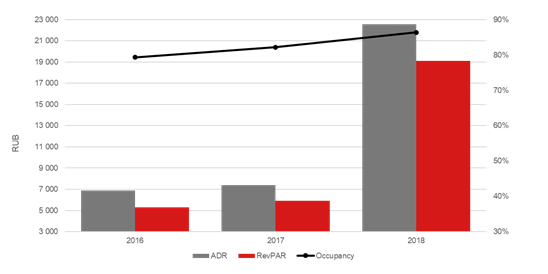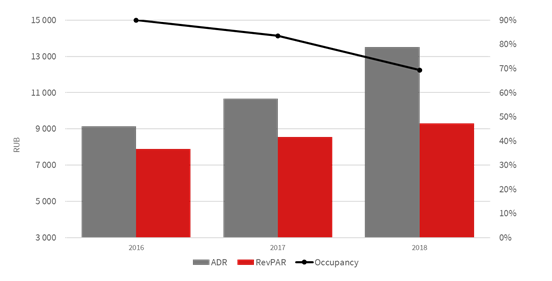Vacation Real Estate News

Two Russian Hotel Markets Enjoy World Cup Soccer Tourism Boost this Summer
Vacation News » Moscow Edition | By Monsef Rachid | September 4, 2018 8:00 AM ET
Hotels in the two Russian cities of Moscow and Saint Petersburg recently enjoy the benefits of massive tourism inflows with the recent World Cup Soccer event. But according to JLL, the championship had different influences on hotels in Moscow and St. Petersburg.
The most significant influence of the large-scale event of 2018 has been on rates: the average price (ADR) for the months of the Championship in Moscow was RUB22,600, which is three times higher than in 2017 (RUB7,400). The Northern capital also took advantage of the rush demand: hoteliers raised prices by 30% compared to 2017, to RUB13,500.
"July largely continued the trends that were set by June. Apparently, in the process of event preparations, the accommodation in Moscow as the central hub of the championship was more in demand, but after the championship the demand winded down, there was no prolonged effect observed: the fans didn't stay in the city as tourists to see the sights. This is clearly visible from analyzing the occupancy figures: 89% sold rooms in June in Moscow and 'only' 84% in July. In St. Petersburg, the percentage of occupied rooms was roughly even between the two months: 69.1% in June and 69.6% in July", reports Tatiana Veller, Head of JLL Hotels & Hospitality Group, Russia & CIS. - "ADR also followed this trend: in Moscow, the average market price for all segments was RUB20,800 in June and RUB20,600 in July. The situation is more pronounced in St. Petersburg: RUB14,600 in June and RUB12,400 in July."
The record holders for the two months of the competition of the Moscow hotel market were:
- by occupancy dynamics - Luxury segment (+12 ppt to the previous year, up to 86%);
- by occupancy level - Upper Midscale segment (91% of the sold rooms);
- by ADR dynamics - Luxury (growth by 4 times, up to RUB71,200);
- by RevPAR dynamics - Luxury (366% growth, up to RUB 60,900).
St. Petersburg hotel market trends included:
- by occupancy dynamics - unfortunately, here we are talking about the minimum losses among the segments, and this is the Upscale segment, where the occupancy decreased by 5 ppt in comparison with two similar months of the previous year, to the level of 84% (that made this segment also a leader in terms of occupancy);
- by ADR dynamics - Midscale segment (41% growth, up to RUB7,200);
- by RevPAR dynamics - Upscale segment (growth of 22%, up to RUB10,200).
"In general, it is worth noting that the World Cup Championship didn't bring the expected results to the hoteliers of the Northern capital. Judging by the dynamics of the indices in certain segments of the market (the lower the segment, the more pronounced the growth in prices in percentage terms), the event attracted mainly price-conscious demand, while discouraging traditional tourists. No doubt, Moscow benefitted, completely meeting the forecasts both for the price increase and for the occupancy growth. We can say with full confidence, that this summer's records of ADR and occupancy in hotels of the Russian capital are unlikely to be repeated soon", said Tatiana Veller.
Despite very different results, both markets managed to increase the profitability of rooms in the first two months of this summer, however, at varying levels: in Moscow, RevPAR rose by 224%, to RUB19,100, while in St. Petersburg, it grew only by 9%, to RUB9,300.
"We should take into account that in the last four years before the Championship - the period of most active preparations of the hotel market of two cities for the event - 5,400 branded rooms were introduced in Moscow, and more than 1,100 rooms appeared in St. Petersburg. Considering this supply growth, we can call the operating results of hotels during the Football Cup quite satisfactory, because it was a tight fight for a very 'dear' visitor (in all meanings) amidst growing competition and the quality of supply in the market", concludes Tatiana Veller.
Sign Up Free | The WPJ Weekly Newsletter
Relevant real estate news.
Actionable market intelligence.
Right to your inbox every week.
Real Estate Listings Showcase
Related News Stories
Vacation Real Estate Headlines
- Record 119 Million Americans Traveling Over the Christmas Holidays
- 80 Million Americans to Hit the Road, Skies and Seas for 2024 Thanksgiving Holiday
- Asia Pacific Hotel Investment to Exceed $12 Billion in 2024
- Asia Pacific Hotel Investment Tops $12 Billion in 2024
- Seattle, Orlando and New York Top Labor Day Destinations in 2024
- Record 71 Million Americans Traveling Over July Fourth Week
- Major Hotel Operators Expanding Rapidly Across Asia Pacific in 2024
- 44 Million Traveling Memorial Day Weekend, Second Most in History
- South Korea is Asia Pacific's Top Performing Hotel Market
- Florida Dominates Top 10 U.S. Cities List to Invest in Short Term Rentals
- Investment in South Korea Hotels Dipped in 2023
- European Hotel Values Still Below Pre-Covid Prices
- Over 115 Million Americans Traveling Over Christmas Holidays
- 55.4 Million Americans on the Move Thanksgiving Holiday
- Asia Pacific Tourism to Approach Full Recovery in 2024, Driving Hotel Sector Growth
- Asia Pacific Hotel Revenues to Rise in 2024 Despite Economic Volatility
- Tourist Bookings to Hawaii Down 50 Percent Since Maui Wildfires
- Demand for Vacation Homes in U.S. Hit 7-Year Low in August
- International Travel for Americans Jumps Over 200 Percent in 2023
- U.S. Labor Day Weekend Travel To Uptick in 2023
- Asia Pacific Hotel Investment Collapses 51 Percent in 2023
- As Summer Travel Season Winds Down, U.S. Gas Prices Rise Again
- Record Setting 50.7 Million Americans to Travel This July Fourth Holiday
- Israel Hotels Poised for Growth as International Visitors Set to Return
- Over 42 Million Americans to Travel This Memorial Holiday Weekend
- European Hotel Transactions Decline 18 Percent in 2022 as Interest Rates Surge
- U.S. Vacation Home Demand Dives 50 Percent from Pre-Pandemic Levels
- European Hotel Values Upticked 3 Percent in 2022
- U.S. Vacation Rental Bookings Rise 27 Percent Annually in January
- Third-Party Hotel Operators Set to Increase Across Europe in 2023
- 113 Million People Traveling in the U.S. During the 2022 Holiday Season
- London Hotels Set to Weather High Inflation in 2022
- Almost 55 Million People to Travel This Thanksgiving Holiday in America
- Düsseldorf Hotels Enjoy Growing Corporate Demand in 2022
- Global Hotel Investment Activity in Asia Pacific to Rise 80 Percent in 2022
- Japan Lifts Foreign Inbound Covid Travel Restrictions in October
- Demand for Second Vacation Homes in the U.S. Decline
- Amsterdam Hotels Enjoy Comeback Post Covid Travel Restrictions
- 47.9 Million Americans Will Travel This July 4th Weekend
- High Prices, Rising Rates, Economic Uncertainty Ends Vacation Home Boom in America







